Did you know the global indoor gardening market is set to hit $32.5 billion by 2026? This growth is fueled by the rise of organic indoor herb gardens. More people are enjoying the benefits of growing their own fresh herbs at home. This guide is perfect for anyone, whether you’re new to gardening or have years of experience. It will give you all the info you need to start a successful organic indoor herb garden.
Key Takeaways
- Growing herbs indoors is a rewarding and practical hobby that can enhance your cooking and provide health benefits.
- Choosing the right herbs for your indoor growing conditions is key to successful cultivation.
- Proper lighting, watering, and temperature control are essential for keeping your indoor herb garden thriving.
- Organic gardening methods can help you cultivate delicious, pesticide-free herbs right at home.
- With the right setup and care, you can enjoy a bountiful harvest of fresh herbs all year round.
Benefits of Growing Herbs Indoors
Growing an indoor herb garden brings many benefits. You can enjoy fresh, homegrown herbs that make your cooking better. These herbs add amazing flavors and aromas that you won’t find in store-bought ones. Having your own culinary herbs means you always have them ready for your meals, making cooking more fun.
Flavorful and Aromatic Cooking
Growing fresh herbs at home lets you enjoy their true taste and smell. Homegrown herbs are fresher and more flavorful than what you buy in stores. With an indoor herb garden, you can pick just the right amount for your dishes. This ensures your meals are always full of real, vibrant flavors.
Health Benefits of Fresh Herbs
Many herbs are not just for cooking; they’re also good for your health. Herbs like oregano, rosemary, and peppermint are full of antioxidants, anti-inflammatory compounds, and antibacterial properties. Growing your own organic herbs indoors means you can easily use these medicinal herbs for their health benefits and tasty flavors.
“Herbs possess a unique combination of volatile oils, tannins, and other therapeutic compounds that can offer significant health benefits.”
Choosing the Right Herbs for Indoor Growing
Starting an indoor herb garden means picking herbs that are easy to grow and keep up with at home. Some top easy-to-grow herbs and low-maintenance herbs for beginners include:
- Basil
- Chives
- Cilantro
- Mint
- Oregano
- Parsley
- Rosemary
- Sage
- Thyme
These herbs for beginners do well in indoor settings and add fresh flavors to your cooking.
Herbs for Different Growing Conditions
Not all herbs need the same things to grow. Some like herbs for dry soil and lots of sun, while others prefer herbs for humid environments with less sun. Think about what each herb needs when planning your indoor garden.
Mediterranean herbs like rosemary and sage like dry soil. Mint and parsley like herbs for low light and more moisture. Picking the right herbs for your home’s conditions helps them grow well.
“Growing herbs indoors is a rewarding way to enjoy fresh, flavorful ingredients year-round, even in small spaces.”
Setting Up Your Indoor Herb Garden
Starting an indoor herb garden is a fun and tasty journey. It brings fresh homegrown herbs right to your kitchen. First, pick the best herb garden containers and potting mix for your herbs to flourish.
Containers and Potting Mix
Herbs do well in individual containers that meet their needs. Choose pots with a 6-inch diameter and depth for enough drainage for indoor herbs. Terra cotta pots are great because they help prevent too much water.
For potting soil for herbs, use a top-quality, well-draining mix made for containers. Don’t use dense garden soil, as it can get waterlogged and cause root rot indoors.
| Container Material | Ideal Pot Size | Potting Mix Recommendation |
|---|---|---|
| Terra Cotta | Minimum 6-inch diameter and depth | Well-draining, container-specific potting mix |
| Plastic | Minimum 6-inch diameter and depth | Well-draining, container-specific potting mix |
| Ceramic | Minimum 6-inch diameter and depth | Well-draining, container-specific potting mix |
With the right herb garden containers and potting mix, your indoor herbs will grow well and give you lots of harvests.
Lighting Requirements for Indoor Herbs
Growing herbs indoors needs the right amount of light for them to grow well. They need lots of sunlight, about 6 hours a day, best in a south or southwest window. If your home lacks enough natural light, use LED grow lights for herbs.
It’s important to place the indoor herb lighting near the plants. As the herbs get taller, move the lights up too. Some herbs like parsley and mint can handle less light, making them great for herbs for low light spots.
| Herb | Minimum Light Requirements |
|---|---|
| Basil | 6-8 hours of direct sun or LED grow lights |
| Thyme | 4-6 hours of direct sun or LED grow lights |
| Parsley | 4-6 hours of indirect or partial sun |
| Mint | 4-6 hours of indirect or partial sun |
With the right grow lights for herbs, your indoor herb garden will get the light it needs. This ensures your plants grow well and give you a lot of fresh herbs, even with little natural light at home.
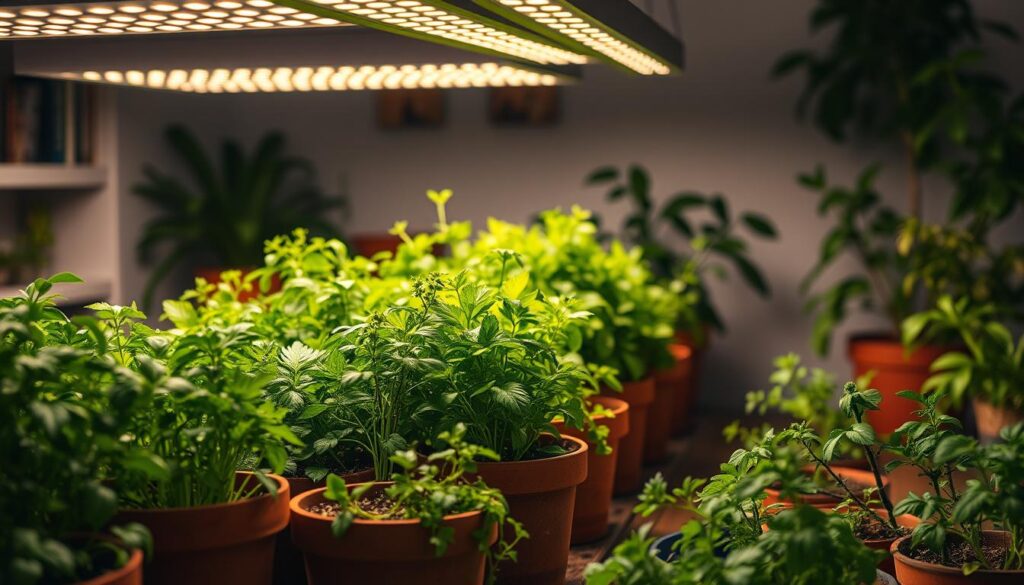
Watering and Humidity Needs
Getting the right moisture level is key when watering herbs indoors. Check the soil before watering – add water only when the top inch or two feels dry. Herbs like mint and basil like soil that’s always a bit damp. On the other hand, rosemary and thyme can handle drier soil.
Moisture Levels for Different Herbs
For a healthy indoor herb garden, watch how much water each plant needs. Some herbs that love humidity need more water often. Others prefer herbs that prefer dry soil and do well with less.
| Herb | Ideal Soil Moisture |
|---|---|
| Basil | Consistently moist |
| Mint | Consistently moist |
| Rosemary | Slightly dry between waterings |
| Thyme | Slightly dry between waterings |
| Oregano | Slightly dry between waterings |
To boost humidity for your herbs, put pots on trays filled with pebbles or use a humidifier, especially in the dry winter. With proper watering and humidity, your indoor herbs will flourish all year.
Temperature and Air Circulation
Keeping the right temperature and air flow is key for your indoor herb garden’s health. By setting the right conditions, your herbs will grow well and avoid diseases and slow growth.
The ideal temperature range for most herbs is 65-75°F. Don’t put your herb pots near cold windows, as this can hurt the leaves. Air circulation is also vital to stop moisture buildup and fungal diseases. Move your plants around or use a fan to keep air moving, but don’t blow it straight on the herbs.
- Aim for an ideal temperature range of 65-75°F for your indoor herbs
- Keep herb pots away from cold windows to prevent leaf damage
- Ensure good air circulation to prevent disease and promote healthy growth
- Use a fan or rearrange plants to keep the air moving, but avoid blowing directly on the herbs
By keeping the optimal temperature and air flow, your indoor herb garden will do great. This also stops diseases and slow growth from bad conditions.
Fertilizing Indoor Herb Plants
To keep your indoor herb garden healthy, you need to do more than just give them light and water. You must also feed them the right nutrients through regular fertilization. Since indoor herbs don’t get the same nutrients as outdoor plants, they need extra care.
Use a balanced liquid plant food or organic fertilizers for herbs like liquid humus, composted manures, or seaweed extracts. These organic fertilizers for herbs should be used at half strength every other week during the growing season. Be careful not to overfeed your plants. Too much fertilizer can harm them.
“The key to healthy, flavorful indoor herbs is providing them with the right balance of nutrients through regular, gentle fertilization.”
With a gentle fertilizing routine, your indoor herbs will get the nutrient needs for herbs they need. This way, you’ll have a lot of fresh, tasty herbs for your cooking.
Organic indoor herb garden
Creating an organic indoor herb garden is a great way to enjoy fresh, tasty herbs and live a sustainable life. Use organic potting mix, skip synthetic fertilizers, and choose natural pest control. This way, you get to enjoy delicious herbs and lessen your environmental impact.
Growing your own food indoors means you can eat fresh all year without harmful chemicals. It keeps your herbs pure and supports a sustainable food system. Plus, it lets you enjoy nature’s gifts at home, perfect for small spaces or changing weather.
- Utilize organic potting mix to nourish your herbs without synthetic chemicals
- Explore natural pest control methods, such as introducing beneficial insects or using eco-friendly sprays
- Experiment with a variety of easy-to-grow indoor herbs, such as basil, mint, and thyme
- Enjoy the versatility of fresh herbs in your cooking, enhancing the flavor and aroma of your dishes
By choosing organic gardening, you make a sustainable and eco-friendly herb garden at home. It feeds your body with healthy, tasty ingredients and helps the planet. It’s a rewarding and fulfilling choice.
“Organic gardening is not just about growing food – it’s about cultivating a healthier, more sustainable way of life.”
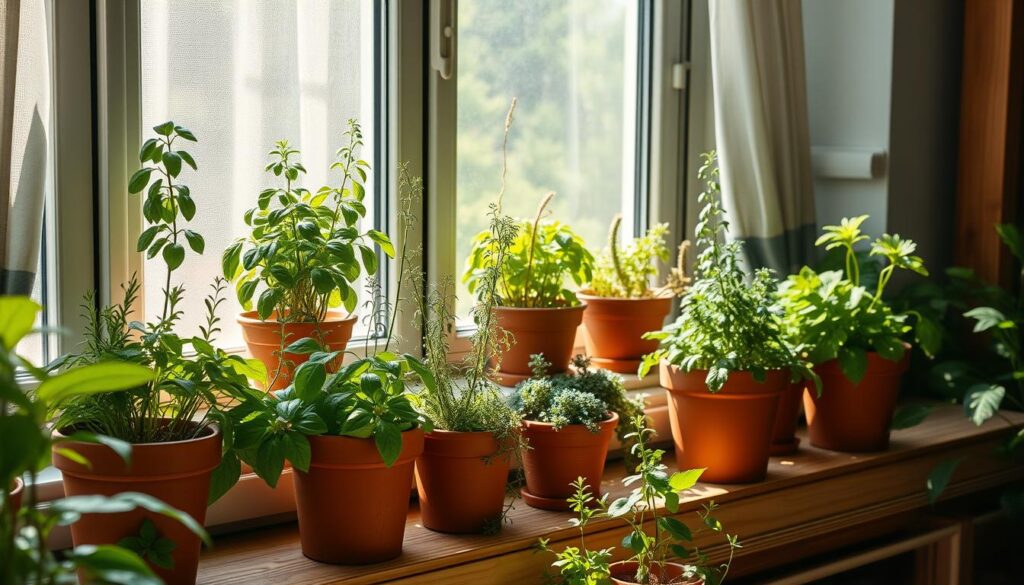
With a bit of care, your indoor space can become a lush sustainable indoor gardening spot. Here, nature’s flavors thrive, and organic gardening values grow. Enjoy the happiness of eco-friendly herb growing and discover new flavors right at your fingertips.
Conclusion
Congratulations on starting your organic indoor herb garden! Growing your own herbs at home is rewarding and beneficial. It lets you have fresh, healthy herbs anytime you want to make your dishes taste better.
Whether you’re new to gardening or have been doing it for years, an indoor herb garden is great. It improves your cooking and is good for your health. With the right tips, you can easily start and keep a thriving indoor herb garden.
Enjoy the fun of growing herbs indoors and let your cooking get better. Enjoy the fresh tastes, the health perks, and the pride of having a green space at home. Happy growing!
FAQ
What are the benefits of growing an organic indoor herb garden?
What are some of the best herbs to grow indoors?
What are the key factors to consider when setting up an indoor herb garden?
How do I ensure proper watering and humidity for my indoor herbs?
How often should I fertilize my indoor herb plants?
What are the benefits of growing an organic indoor herb garden?
Source Links
- Ultimate Beginner’s Guide to Growing Herbs Indoors – https://www.planetnatural.com/grow-herbs-indoors/
- Growing Herbs 101: How to Start a Kitchen Herb Garden, Indoors or Out – https://homesteadandchill.com/grow-herbs-101-kitchen-herb-garden/
- I Spent Months Testing Indoor Herb Gardens to Find Out Which Three Worked Best – https://www.seriouseats.com/best-indoor-herb-gardens-7563224


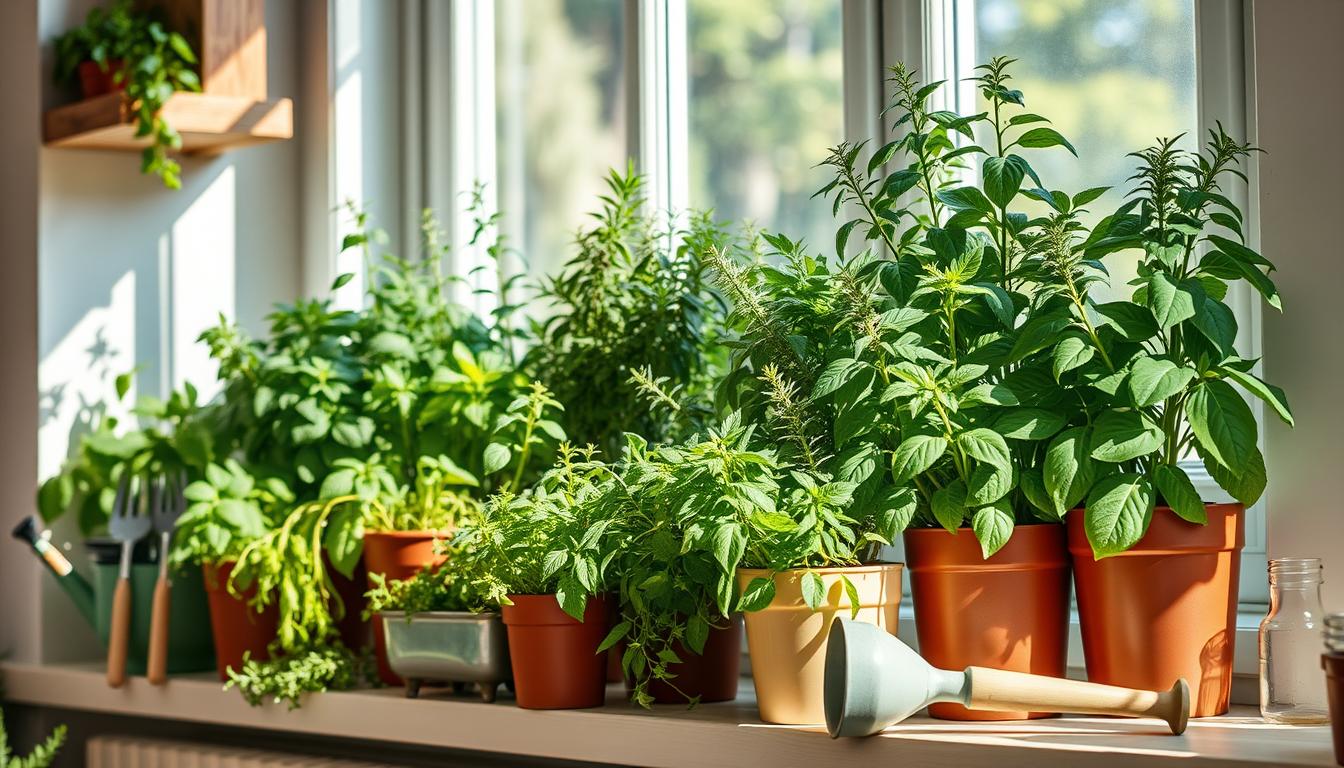
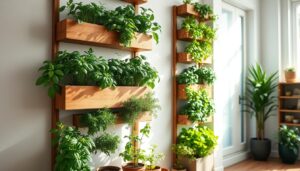
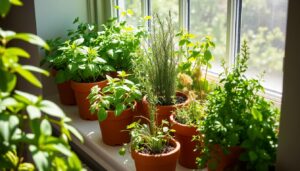
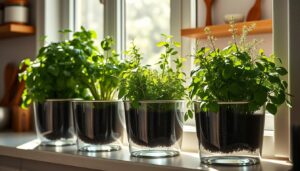
Pingback: Essential Tools and Techniques for Successful Herb Propagation